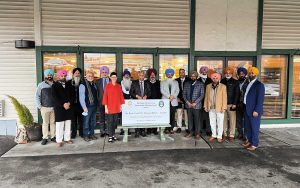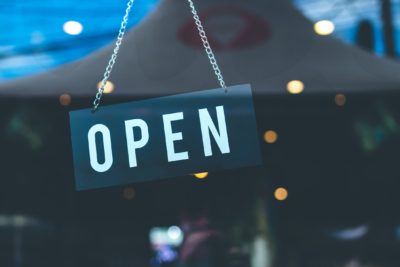Recovery from last November’s devastating floods is well underway, but amid more severe weather and COVID-19, there is still much to be done. In January 2022, the local Sikh community donated $75,000 to aid these relief efforts. The Whatcom Community Foundation (WCF) matched this donation with a one-for-one grant, resulting in a grand total of $150,000.
The effort was led by Whatcom County Executive Satpal Singh Sidhu. A member of the Sikh community himself, Sidhu reached out to local gurdwaras (temples) as well as Sikh business owners in Seattle to raise funds.
“I am so humbled how promptly the Sikh business community from Seattle and Whatcom County responded to my appeal to help the families devastated by floods in Whatcom County,” says Sidhu.
Giving Back
Beyond donations, Sidhu says that the Sikh community also provided meals to flood victims and the community as a whole.
“We have three different temples [in Whatcom County] and they all had hot food,” Sidhu says. “But because of floods and transportation, it became a real issue to reach people. They were in different shelters, and we as a government were already sending food. We thought, okay, this is not something that would be very efficient.”
Turning his attention to fundraising, Sidhu involved longtime friend Hardev Singh Juj. Juj has focused on volunteer work in Seattle’s Sikh community since his retirement as chief engineer and vice president of Bonneville Power Administration (BPA) in 2015.
Sidhu and Juj appealed to Sikh business owners in Seattle over lunch in January of 2022. The effort was a success: In under 10 minutes, they had received $40,000 in donations. Next, Juj and Sidhu organized a radiothon on Seattle’s Radio Punjab.
Soon enough the Sikh community had raised a total of $75,000 for flood relief. Juj says this was a joint effort between Whatcom and Seattle, with $25,000 coming from Whatcom and $50,000 from the Seattle Metropolitan Area.
Involvement of the Whatcom Community Foundation
Realizing that a collaboration would be helpful when appealing to the community, Sidhu reached out to WCF CEO Mauri Ingram. She agreed to match the Sikh community’s donation, resulting in a total of $150,000.
Sidhu and the Sikh community first collaborated with WCF to construct the Arch of Healing and Reconciliation across from City Hall. The arch was built to honor Indian, Chinese, and Japanese immigrants in Bellingham, many of whom were targeted and forcibly removed by white mobs in 1885, 1907 and 1942. WCF contributed $25,000 to its construction.
“When we met, the donors offered thoughtful questions and suggestions that are helping to inform the way the Community Foundation moves forward in our ongoing relief and recovery efforts as well as in preparation for future disasters,” Ingram says. “One donor captured the essence of the opportunity their gifts have seeded with a variation on a quote from Henry Ford: ‘To come together is a beginning. To work together is progress. To stay together is success.’ We can have success.”

Community Need
Even months after November’s floods, the donation comes at a time of great need. Sidhu says roughly 1,900 structures were destroyed in the flood, with 1,500 of these being homes, and more than 600 families were displaced.
President Joe Biden declared Whatcom and Skagit counties as disaster areas in January, meaning that homeowners and small businesses will be eligible for federal assistance. Though this is positive news, recovery efforts have been further complicated by the January snowstorm and COVID-19 surge.
The pandemic has made volunteer recruitment difficult, and shelters must comply with social distancing requirements. As a result, the county has utilized non-traditional methods to accommodate affected families.
“There is a Punjabi farmer; he has a couple thousand acres of berries and has farmworker housing up near Sumas,” Sidhu says. “He has about 200 cabins. And he said, ‘Hey, we don’t have workers here, so you’re welcome to use it whichever way you like.’”
The Sikh Community in Whatcom County
Roughly 4,000 of the county’s 235,000 residents identify as Sikh, but the community is a significant contributor to the local economy. In a specific example, Whatcom County is the top raspberry producer in the U.S.– and roughly half of total berry production comes from Sikh farmers. Sidhu notes that this statistic is indicative of the community’s work ethic.
Since the early ‘80s, when Sikhs returned to Whatcom County after expulsion in the 1907 riots, they have prospered and contributed to the local economy not only by paying taxes but creating more than 1,000 jobs. Punjabi businesses in Whatcom County alone include thousands of acres of berry farming, trucking companies with more than 200 semi-trucks, hundreds of gas stations and fast-food outlets, motels, and home construction businesses.
Charitable actions are intrinsic to Sikhism; for example, the Guru Nanak Gursikh Temple in Lynden has always provided hot meals (langar) for the homeless population in Bellingham regardless of religion. On a more personal level, Sidhu mentions Mr. Gill, a Sikh gas station owner in Blaine. At the onset of 2020’s COVID-19 shutdowns, Gill offered a free gallon of milk with two loaves of bread to anyone for four months.
Juj clarifies that this work is in no way tied to politics. Rather, it’s about compassion and respect for neighbors and the community as a whole.
“The Sikh community is not sitting on the side when a need arises in Whatcom County or anywhere else. We are part of the mainstream,” says Juj. “We have the same blood going through our veins, and we need to stand up anywhere the community needs it.”
For additional information on flood response and resources, visit Whatcom Strong (whatcomstrong.com) and the Whatcom County website (whatcomcounty.us). The Whatcom Community Foundation can be found online at whatcomcf.org.





